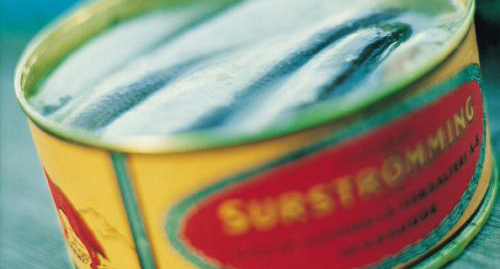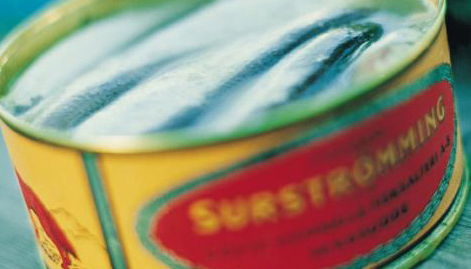EU's newest foe: Sweden's fermented herring
"Surströmming" threatened by stuffed-shirt, raised noses of EU food czars.
-
 Once homely survival food, pungent preserved dishes such as surströmming have evolved into present-day delicacies – for (some) Swedes, anyway...
Once homely survival food, pungent preserved dishes such as surströmming have evolved into present-day delicacies – for (some) Swedes, anyway... -
-
Surströmming joined Swedish snus as cherished traditions of the Scandinavian nation that are being attacked and slated for extermination by the bureaucrats of the European Union.
-

-
-
Pleading before the John Dalli, the European Union's health and consumer policy commissioner in late June, Sweden's minister of agriculture, Eskil Erlandsson, begged for a repreive for his country's beloved - albeit foul smelling - fermented herring, known in Swedish as "Surströmming."
-
Best served cold and popular in certain parts of northern Sweden, surströmming is sold in cans that bulge due to the constant fermentation of the fish, and it is this important part of preparing the product after packaging that emits a pungent odor when the metal containers are opened. Served cold, Surströmming is popular only in northern Sweden or among relocated former northerners - Norrlänningar. It is sold in bulging cans due to the continued fermentation and when opened gives off a pungent smell - When opened, the can releases a mighty puff of mercaptane gas, a substance so potent that 0.000,000,000,04 of a gram per liter of air is quite enough to make it fully perceptible... "The world's smelliest dish."
-
With aficionados claiming that the taste must be acquired over time, the delicacy is frequently eaten outdoors, encased inside a hard bread sandwich, and accompanied with generous portions of sour cream, onions and fingerling potatoes. Upon advice from a fellow eurocrat, the EU commissioner refused to so much as venture a taste of the Swedish delicacy during his recent visit to the country.
-
Surströmming is included in a special EU exemption that enables their sale, despite high dioxin levels in the Baltic sea waters where they are caught. However, the stay of execution for the centuries old product runs out of time at the end of next year.
-
For more info on the dish, see http://www.nordstjernan.com/news/education/1566/ and on its serving traditions in Sweden, see http://www.nordstjernan.com/news/traditions/672/
-
-
